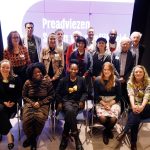On November 7, 2024, we held the fourth and final roundtable meeting with stakeholders as part of the RE-WIRING project, focused on addressing gender bias in education. The meeting brought together Gifty Obeng from Good Governance Africa – West Africa, Laura Washington from Project Empower, and Maarten Bettens, a graduated primary school teacher and current student of Occupational and Organizational Psychology at KU Leuven. The session was led by Alexandra Lux, with support from Colette van Laar and Indigo Deijmann from KU Leuven, to discuss insights and strategies for promoting gender equity in education and career guidance.
During this roundtable, participants shared experiences from Ghana and South Africa, where parents and teachers play an influential role in students’ career choices. Engaging these key figures is crucial to challenging ingrained stereotypes and supporting students in choosing careers aligned with their personal interests, rather than societal gender norms. However, economic barriers, such as the cost of schooling and the expectation that daughters assist with household or agricultural duties, often prevent girls from pursuing education. Additionally, high rates of gender-based violence and femicide in South Africa pose significant safety challenges for young women, further limiting their access to education.
Key interventions discussed include:
- Parental Engagement Platforms: Establishing parent-teacher association platforms where parents can learn about diverse career options and reflect on potential biases.
- School Accountability for Gender Equity: Introducing accountability measures to ensure gender equity in career counselling and academic opportunities, including regular assessments and teacher training focused on recognizing and challenging gender biases.
- Supporting Students’ Strengths: Helping young people understand and explore their strengths beyond stereotypes fosters confidence and encourages pursuit of non-traditional career paths.
As we conclude this series of roundtables, the insights gained will guide our next steps in developing inclusive, practical resources for educators, parents, and students, supporting a future where career choices are truly open to all.







Leave a Reply